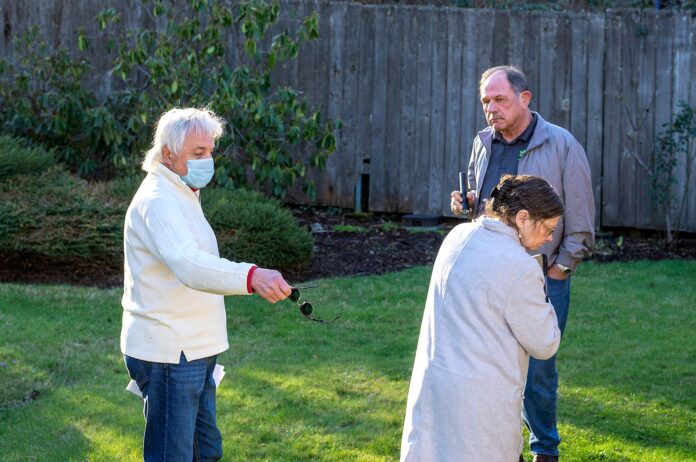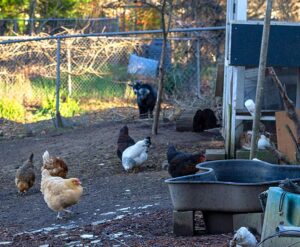
The free-range days of unregulated backyard chickens may be numbered in Tigard as the city begins to explore hemming in its wide-open livestock policies.
City staffers, amid a barrage of nuisance complaints centered on two specific properties, said they are reviewing existing code that leaves chicken and livestock ownership largely unaddressed.
“We know this is a concern. We will continue to review and possibly update the agricultural section of the Tigard municipal code,” Assistant City Manager Kathy Nyland said, addressing both the City Council and several residents of Southwest Ann Street.
As it’s currently written, urban fowl and livestock are addressed only by proxy when unwanted secondary impacts of keeping the animals like noise, odor, or rodents violate nuisance laws. In other words, it’s not a problem unless it’s a problem.
And, for the Southwest Ann Street households seeking change, it has become a major problem.
Roger Potthoff has spoken repeatedly at recent City Council meetings about a rat infestation on his property he believes is being fueled in part by conditions at an unkempt home where more than two dozen chickens and multiple goats are being kept.
“I actually went out and drove to physically look at what Mr. Potthoff was referring to. I took a couple of photos that were pretty shocking to me,” Mayor Jason Snider said. “I think we made a very well-intentioned decision in direction a few years ago … but I definitely don’t think what is happening near Mr. Potthoff’s property is what we had in mind.”
An earlier version of the code required chickens and livestock to be housed at least 100-feet from neighboring properties, effectively prohibiting them in most residential neighborhoods. That ordinance was dropped in 2018.
The property in question “is not a 9-year-old with a couple of chickens, which is what we were deliberating on a few years ago,” Snider said.
Potthoff, who has also spoken privately with Snider and Councilor John Goodhouse, thanked both men for their responsiveness.
Like many Metro-area municipalities have done in the past decade, Tigard loosened regulations to accommodate the growing popularity of backyard chickens. But unlike its neighbors, the city failed to replace prohibition with regulation.
Urban bird fans praise the integration of chickens into residential areas that once banned livestock as a much-needed step toward more sustainable living and locally sourced food. Opponents fear that keeping livestock in urban and suburban neighborhoods will lead to the kind of problems Potthoff his neighbors have documented.
He recently submitted more than a dozen photos of the dead rats he has found or trapped on his property.
“The 15 pictures did not represent an accurate accounting of the rats,” whose numbers are far greater, Potthoff said, adding he’s trapped and killed only a small percentage of what he’s seen.
Most metro-area jurisdictions have met their growing feathered populations with detailed regulations governing the number of animals that may be kept, specifications for their housing and living conditions, and in some jurisdictions, license or permit requirements.
In Tualatin, up to four hens can be kept with a license in low-density residential areas. Roosters are prohibited. Before being granted a license, applicants must provide drawings or detailed descriptions of their coup and enclosed to ensure the setup complies with city code.
Regulations and licensing are similar in Sherwood, where applicants are additionally required to notify neighbors of the coming addition.
Portland permits between four to six mature chickens or any similar sized birds, depending on lot size, and an additional four chicks younger than 12 weeks. No application, license, or permit is required.
“If there are no ordinances to control or to mitigate this type of situation, it’d be nice to focus on it,” said Rich Metzler, another of the Southwest Ann Street neighbors. Metzler said he’s concerned not only for the well-being of humans being impacted but also for the welfare of the animals.
“I’d hate to think that this could continue, and something can’t be done about it,” he said.
The city is investigating nuisance code violations at the properties in question and the impact of urban chickens.
“We’ll have a high-level report coming to Council in May,” Nyland said.






















